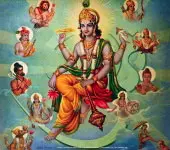The scriptures assert:
- 'One becomes what one does—righteous acts lead to righteousness, and sinful acts lead to sin' ('यथाकारी यथाचारी तथा भवति').
- 'Perform sacrifices, offer oblations, and give charity' ('यजेत् जुहुयाद् दद्यात्').
- 'The soul is the doer because scriptures prescribing duties would be meaningless otherwise' ('कर्ता शास्त्रार्थवत्त्वात्').
At the same time, the scriptures declare, 'God neither creates agency nor actions for beings' ('न कर्तृत्वं न कर्माणि लोकस्य सृजति प्रभुः'). This shows the balance: God does not impose actions but inspires through the inner self, respecting the soul's freedom within the framework of karma.
If the soul were entirely dependent on God, how could scriptures call it the doer? Forcing a being into sinful acts like murder would make God culpable for injustice and cruelty.
The Upanishads also proclaim:
'There is no other seer, hearer, or thinker apart from the Self' ('नान्योऽतोऽस्ति द्रष्टा नान्योऽतोऽस्ति श्रोता नान्योऽतोऽस्ति मन्ता'). This underscores divine independence but does not negate the soul's limited freedom.
What does Yoga Vasishta say about God's role in human actions?
Yoga Vasishta says that God inspires good actions and works for the liberation of souls, but He does not force anyone into good or bad deeds.
How does God control the soul?
God is omnipresent and dwells in every heart, controlling the soul from within as the inner ruler.
If God is controlling everyone from inside, then how can an individual be held responsible for his actions?
God inspires and guides from within, but He does not dictate or force actions. Individuals have free will to choose their actions. While God provides the knowledge, wisdom, and resources, the decision to act lies with the individual. Responsibility arises because every person has the freedom to align with God's guidance or act contrary to it. The results of actions, whether good or bad, are based on the choices made by the individual, not imposed by God. Therefore, accountability rests with the doer, even though God resides within as a guide.
How does the Yoga Vasistha differentiate between the ignorant and the wise?
A: The ignorant see themselves as independent doers of actions, while the wise understand that God inspires actions but does not impose them.
Does this philosophy attribute partiality or cruelty to God?
A: No, it refutes the idea of partiality or cruelty by emphasizing that each being faces the results of their own actions.
What is the ultimate goal of these teachings?
A: The ultimate goal is to help individuals attain unity with God and realize the nature of the soul through wisdom.
Comments
Read more comments
Knowledge Bank
12 names of Saraswati Devi
ॐ ऐं भारत्यै नमः । ॐ सरस्वत्यै नमः । ॐ शारदायै नमः । ॐ हंसवाहिन्यै नमः । ॐ जगतिख्यातायै नमः । ॐ वाणीश्वर्यै नमः । ॐ कौमार्यै नमः । ॐ ब्रह्मचारिण्यै नमः । ॐ बुद्धिदात्र्यै नमः । ॐ वरदायिन्यै नमः । ॐ क्षुद्रघण्टायै नमः । ॐ भुवनेश्वर्यै नमः । Om aim bhaaratyai namaha. Om sarasvatyai namaha. Om shaaradaayai namaha. Om hamsavaahinyai namaha. Om jagatikhyaataayai namaha. Om vaaneeshvaryai namaha. Om kaumaaryai namaha. Om brahmachaarinyai namaha. Om buddhidaatryai namaha. Om varadaayinyai namaha. Om kshudraghantaayai namaha. Om bhuvaneshvaryai namaha.
What is Sanatana Dharma?
Sanatana Dharma is a way of living based on eternal laws. It guides people to live righteously in every aspect of life. These laws are gathered from all available knowledge, both physical and spiritual, and are rooted in the ultimate source of all power and life. This system unites all beings, from humans to subhuman and superhuman creatures, in a harmonious society. It helps every individual grow, find happiness, and avoid pain in this life and the next. Through Sanatana Dharma, people achieve worldly success and the ultimate spiritual goal of Moksha, which brings supreme bliss. In simple terms, Sanatana Dharma is a way of right living, using the best wisdom available to guide every part of life.
Recommended for you
It is not wrong if you say that God does not exist

Dhanwantari Gayatri

आदिवैद्याय विद्महे सुधाहस्ताय धीमहि । तन्नो धन्वन्तरिः....
Click here to know more..Guru Paduka Smriti Stotram

प्रणम्य संविन्मार्गस्थानागमज्ञान् महागुरून्। प्रायश्....
Click here to know more..